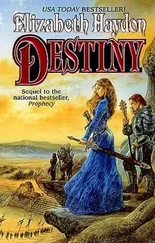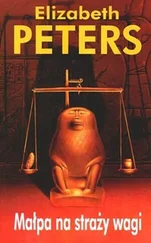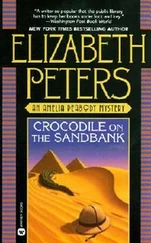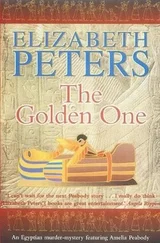“Or perhaps it is Amon Re, or Aton, Akhenaton’s sole god,” I mused aloud.
“The One has many names,” Abdullah replied in sonorous tones. “Do you intend to waste the time we are allotted in meaningless chatter?”
“That sounds more like my old friend,” I said, laughing. “First and most important-I am glad to see you. Why has it been so long?”
“You had no need of me.”
“It was not that I did not think often of you,” I said, answering the implicit reproach. “If I had no other cause, I would remember you whenever I see David or speak with Selim. He has taken on his responsibilities as reis admirably.”
“As he should. He is my son. Now, Sitt, let us speak of other things. Why must you leave your homeland to wander in dangerous and uncivilized places?”
By homeland he meant Egypt. And he was correct; I knew that if I did return after death to a place I loved, it would be this place-looking down on the Valley of the Nile and the scene of my happiest years. This was an old complaint of Abdullah’s; no traveler he, he could never understand why any sane person would want to be anywhere else.
“It was Emerson’s idea,” I said disingenuously. “Should I not follow my husband wherever he leads?”
“Ha,” said Abdullah, condensing a paragraph of sarcasm into a single syllable.
I did not defend myself, although in this particular case my statement was true. Abdullah would only go on and on about “taking foolish chances” and not being careful.
“What about giving me some practical advice for a change?” I inquired. “Or a hint of dangers to be avoided?”
“Rather,” said Abdullah, folding his arms and looking stern, “I will tell you what I think of your latest foolish action. My grandson has bared his throat to the knives of your enemies. Why did you let him go?”
“I forbade him to go. He has never disobeyed me before. But I should have done more, I should have…Oh, Abdullah, don’t scold me, I am too miserable and too worried.”
I hid my face in my hands. For a moment I imagined I felt a touch, fleeting as the flutter of a bird’s wing, against my cheek. When Abdullah spoke, his voice was very gentle.
“Ramses is his friend, close as a brother. How could David do otherwise and keep his honor?”
“That is just like a man,” I said bitterly. “I don’t give a curse about his honor, or that of Ramses. I want them back, safe and sound. And soon. What shall I do?”
“Wait,” said Abdullah.
I turned on him, so abruptly that he stepped back a pace. He had been standing very close. I had known, instinctively, that I must not try to touch him in these visions.
“I know that is advice you do not like,” Abdullah said. “But I cannot tell you the future, Sitt. Until it becomes the present, it exists as one possibility out of many. You are not the one who determines what will come to pass.”
“Yes, yes, I know. It is in the hands of God,” I said.
“In the end. But He works through human agents and you are only one of them. A powerful agent to be sure,” he added, and I saw that he was smiling.
“Tell me, at least, that they are both alive. Please, Abdullah. I can wait-if I must-for a while-if I know that.”
“The allotted time has passed, Sitt.”
There were rules in this strange other world, and my question had violated one of them. Sunk in despair, I watched him walk slowly away, along the path that would lead him across the plateau to the royal valley. Slowly and more slowly he went…And turned, and spoke a single word.
And I woke with my face wet with tears and my heart filled with joy.
EMERSON WAS STILL SOUND ASLEEP, so I lay quiet beside him, watching the gray light brighten at the window. Morning brought the inevitable reaction to my moments of happiness. Doubt and-yes, I admit it-irritation. Those visions of my dear old friend comforted me for his loss and I never doubted the truth of what he told me. But it was an infuriatingly limited truth. Why hadn’t I phrased that final question differently? It was not enough to know that the boys were still alive. I wanted a glimpse into the future and advice on what to do.
Emerson let out a grunt and turned over. His outflung arm landed heavily on my diaphragm, but being accustomed to this maneuver I was prepared for it. I had no intention of mentioning my dream to Emerson. He would not have found it as meaningful as I, since he did not believe in the reality of those visions. Once he had made the mistake of referring to them as products of my unconscious mind. I had of course reminded him that he did not believe in the unconscious mind either.
By the time Emerson began muttering and thrashing about, in his habitual prelude to waking up, I had come to a decision. Abdullah had given me one piece of advice. “Wait.” It went against the grain, no doubt of it, but it did accord with my preliminary plan: to give the boys a few more days and in the meantime carry out our initial purpose, or at least make a good beginning.
I arranged for breakfast to be served in our room, since I knew Emerson was incapable of reasoned discourse until he had had several cups of coffee. When the servant arrived he brought with him two messages. Emerson was splashing about in the washbasin at the time, so I hastily inspected them. None bore the writing I had hoped to see, so I handed them over to Emerson unopened and waited impatiently until he had imbibed a sufficient amount of caffeine.
“Well, well,” he remarked, perusing the first. “Our arrival, it seems, has become known. Furman Ward of the American Palestine Organization begs the favor of a meeting at our earliest convenience.”
“I am not familiar with that organization, Emerson.”
“It is, I believe, of fairly recent date. This,” he continued, “is from Ward’s British counterpart. He would be happy to call on us as soon as is possible.”
He handed the notes to me. “There is a certain air of urgency about them,” I commented. “I believe I can hazard a guess as to what-or rather, who-has prompted it.”
“More than a random guess, Peabody. Morley has been here for several weeks, long enough to stir up the local archaeological community. Suppose we call on these gentlemen this morning? They can tell us what the bastard has been up to.”
We dispatched messages to the individuals in question. I could only hope that they would be able to receive us, for Emerson refused to wait for a reply. He never made appointments; he simply turned up and carried on with extreme indignation if the person he wanted was not there. Ah, well, I told myself philosophically, we would at least enjoy a stroll through the hallowed streets of the world’s holiest city.
The others were finishing their breakfast when we joined them. Nefret’s eyes were shadowed, as if she had not slept well. Daoud was his usual placid self but Selim seemed a trifle on edge. He kept looking at a group on the far side of the room. Heads bowed, Bibles in their hands, they were intent upon a peroration delivered by one of their number. Garbed all in black, he resembled a bird of prey, with a nose like a beak and thin, clawlike fingers. His eyes were raised to heaven (the ceiling of the dining salon, to be precise) and his voice was remarkably penetrating; I could hear him clear across the room.
“‘Beautiful for situation, the joy of the earth, is Mount Zion.’ How true the words of the Psalmist, O my beloved brothers and sisters! If her beautiful situation charms us now, what will it be in that day when the true king returns, when that psalm will have its perfect fulfillment?”
“Good Gad,” said Emerson, over a chorus of rapturous “amen’s.” “Why is that fellow making such a racket? He needs to be reminded of his manners. This is not a cursed church.”
Читать дальше








